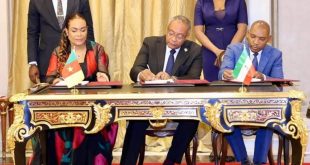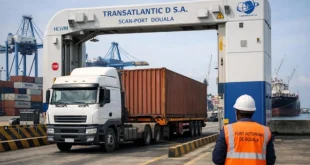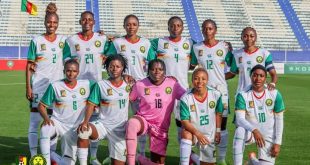CameroonOnline.ORG | Issa Tchiroma Bakary: A Contested Victory And A Country At A Crossroads
(Based on the interview with lawyer Jamal Taleb on Global Africa Telesud)
In the aftermath of Cameroon’s presidential election, one figure continues to challenge the official narrative: Issa Tchiroma Bakary. Officially, he finished second. In his own camp, he is “the elected president.”
On the programme Afric Actu on Global Africa Telesud, Paris–based lawyer Jamal Taleb, member of the legal team defending Tchiroma, lays out the strategy, the evidence, and the risks surrounding this claim of victory. The result is a portrait of a country suspended between an exhausted past and a dangerous, uncertain future.
From insider of the system to challenger of the system
Issa Tchiroma Bakary is not an outsider. He served in government for many years and knows the state machinery from the inside. According to Taleb, this long experience is precisely what led Tchiroma to break with what he now calls a “comedy” of elections and to run for president in 2025 on a different basis.
His decision to stand was not improvised. Taleb insists that the June 2025 announcement of Tchiroma’s candidacy came after months, even years, of preparation by his team. This preparation was not only political, but also technical and legal: understanding the electoral map, anticipating fraud, and building a method to verify the “truth of the ballot box” independently of the authorities.
An 83 percent sample and a 64 percent claim
At the heart of Tchiroma’s claim is a specific strategy. Cameroon has roughly 53 departments, but his team identified 18 that together represent about 83 percent of the electorate. Instead of spreading resources thinly across the entire country, they concentrated their efforts on these key departments.
In practical terms, that meant deploying agents and observers to as many polling stations as possible in those 18 departments, with one primary objective: obtain copies of the official results sheets, the procès-verbaux (PVs).
On the basis of these PVs, Taleb explains, Tchiroma’s camp calculated a result of around 64 percent of the vote in this 83 percent “sample” of the electorate. From there, their conclusion is simple: even if the remaining 17 percent of the electorate had voted overwhelmingly for outgoing president Paul Biya, it would not be sufficient to close the gap without, according to them, “inverting” the result.
The campaign says it has made these PVs available to the press, civil society, and international partners so that anyone can verify the numbers. For Taleb, this is more than a political claim. It is a challenge: if the electoral commission ELECAM or the Constitutional Council dispute these figures, they should accept an independent audit comparing their official tallies with the PVs collected by the Tchiroma camp.
In their view, the official results proclaimed by ELECAM and the Constitutional Council are “fanciful.” Their demand is straightforward: open the books, compare the documents, and let the evidence speak.
A president “in danger” and the shadow of violence
The dispute is not only about numbers. It is also about security.
Taleb confirms that Issa Tchiroma has left his usual residence and is now in what he calls a “safe location,” reportedly protected by a fraction of the Cameroonian army that recognises him as the legitimate president. According to Taleb, the move became necessary after snipers were seen around Tchiroma’s home, and after two members of his family and one of his household staff (a cook) were kidnapped.
In this narrative, a part of the army is not entering into a logic of civil war, but rather aligning itself with what it sees as the legitimate authority. Taleb insists that this segment of the army is not seeking confrontation, but is choosing to protect the person it considers to be the elected president in a context where his life is threatened.
“Ville morte”: civil disobedience, not chaos
Parallel to the legal and security dimensions, Tchiroma has addressed the population directly. He released a short video calling for an operation ville morte (a nationwide “ghost town” or shutdown) from Monday to 5 November.
Taleb is very keen to frame this as a peaceful strategy of civil disobedience. According to him, Tchiroma has never called for violence, looting, or destruction of property. On the contrary, he distinguishes clearly between the Cameroonian state and its people, who must be protected, and a ruling circle that, in his view, has “confiscated power” for decades.
The reference to ville morte is not accidental. Taleb places this call in the tradition of Gandhi and Martin Luther King Jr., a method of mass, nonviolent resistance used to say “no” to systemic injustice. For Tchiroma and his supporters, the message is simple: enough electoral theft, enough disorder, enough infantilisation of the Cameroonian people.
A divided country and an unexpected coalition
Cameroon is often described as a country of fractures:
-
North versus South,
-
Anglophones versus Francophones,
-
ethnic and sociological divisions.
Taleb argues that Tchiroma’s candidacy has, at least in part, transcended these lines. He highlights two key facts:
-
Strong support from Anglophone regions, which are already living through a violent and prolonged crisis. Tchiroma, according to Taleb, is the first candidate in a long time to put the old idea of federalism back on the table in a serious way, which has given these regions a new sense of hope.
-
Significant support in Douala, historically a rebellious and politically active city with a complex sociological mix, not traditionally considered a “northern” stronghold.
By promising a five–year mandate (rather than seven), focused on constitutional reform, federal debate, and relaunching a suffering economy, Tchiroma presents himself as a transitional figure rather than a new long–term ruler. For many voters, Taleb suggests, that is exactly what they were waiting for: a change of course without the promise of an endless new presidency.
Regional organisations and Western chancelleries
On the international front, Taleb is harsh toward the African Union. He sees its statement on the election as timid, vague, and more concerned with validating power than defending the lives and dignity of ordinary Cameroonians. In his words, the AU behaves like a “trade union of heads of state.”
By contrast, he notes that the European Union and the French government have at least expressed concern for the situation of Cameroonian citizens, even if their communiqués remain moderate. Taleb places particular weight on one symbolic fact: during previous elections, Western diplomatic representatives were present in force when results were proclaimed. This time, they stayed away. For him, that absence is a sign of unease and a tacit indication that something is wrong.
Naming suspects, building cases
Beyond the immediate electoral dispute, another battle is already beginning: the battle against impunity.
Taleb confirms the existence of a list circulating on social networks, naming alleged “war criminals” and “economic criminals.” According to him, this list originates from Cameroonian civil society, which has decided that this time, those who give unlawful orders and those who execute them must know they will be held to account.
The list targets:
-
security and military officials accused of current abuses,
-
and those responsible for what is described as systematic pillage of the economy over the past four decades.
Taleb explains that civil society is working together with a collective of Cameroonian lawyers, supported by foreign lawyers like himself, to document crimes, gather images and testimonies, and prepare legal action. Possible measures include:
-
asset freezes,
-
criminal prosecutions on the basis of universal jurisdiction,
-
and proceedings before Cameroonian courts “when the time comes.”
His message to soldiers and officers is explicit: obeying a manifestly illegal order does not protect anyone anymore. In a world saturated with smartphones and cameras, where “everyone is a war reporter,” the age of silent, invisible repression is, in his view, over.
“Nothing happens without the Cameroonians”
In the final minutes of the interview, the journalist asks Taleb what strategy he and his team intend to use to have Issa Tchiroma recognised nationally and internationally as president. The lawyer refuses to step outside his role. He reminds the audience that he is not Cameroonian, but a lawyer in Paris. His primary function is to support, not to lead.
Above all, he insists on one principle: nothing can be done without the Cameroonian people. The country belongs to them. If they decide that they are no longer afraid, that they will no longer accept that their victory is taken from them, then they will impose change. The lawyers, he says, will only come afterwards, to support and consolidate that choice in law.
For now, the picture that emerges from his words is that of a nation at a tipping point:
-
a long serving ruler and his circle determined to remain in power,
-
an opposition candidate who claims to have won and who promises only five years to lay new foundations,
-
an army partly loyal to the old order, partly drawn toward a new legitimacy,
-
and a society exhausted by crisis, but still capable of mobilisation.
Whether Issa Tchiroma Bakary will succeed in transforming a contested result into a recognised mandate remains uncertain. What is clear from Jamal Taleb’s interview is that the struggle in Cameroon is no longer only about who governs, but about how long impunity, manipulation, and fear can still define the political horizon of the country.
 CameroonOnline.org Cameroon news, Actualité Camerounaise, live Web TV & Radio, World News and a lot more
CameroonOnline.org Cameroon news, Actualité Camerounaise, live Web TV & Radio, World News and a lot more



